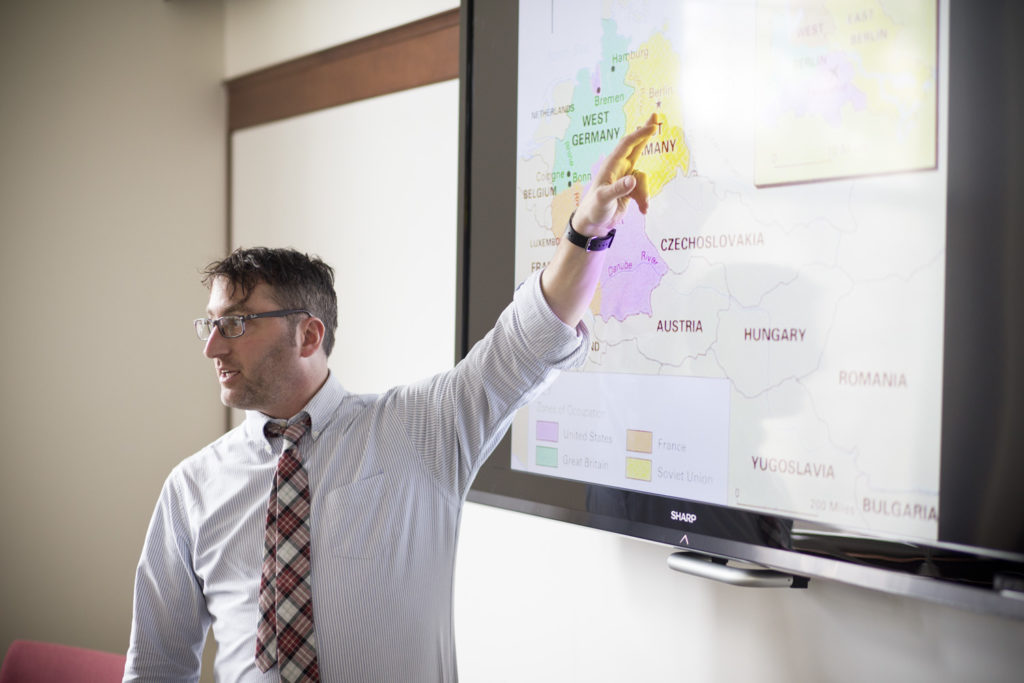My BackStory: History Through Popular Media
“Just put the headphones on and wait for someone to speak to you,” said the friendly woman who oversees the University of New Hampshire’s television and radio studios. Her smile revealed that she knew I was a wee bit nervous.
Being a “first-in-the-nation” state means once every four years our sleepy little college town, Durham, is inundated with CNN, FoxNews, NBC—and too many other media outlets to count—and UNH provides broadcast studios for these professionals to do their thing. When not an election year, these same studios are pretty lonely, vacant hollows waiting for any Joe Schmoe to come along and use them.
On this late afternoon, I was that Joe Schmoe.
I stood in the doorway of the large room that contained some sound deadening materials, a chair, one pair of headphones, a small electronic box that somehow seemed to be very, very expensive, and a microphone equipped with a windscreen. I joked in my own mind about needing a windscreen because I am, after all, a college professor and is there anyone who likes to talk as much as a professor? Best to protect that microphone from my long-winded responses.
I slid the headphones on and heard silence…
A few weeks prior, I had received an email from Adam Shapiro, a producer for the podcast, BackStory. It is not unusual for my inbox to have messages from other scholars, journalists, among others interested in history and my work on Paul Cuffe, a celebrated African American sea captain from Massachusetts.
“Sometimes, those people most interested in your work are right there in front of you.”
Jeff Fortin, Associate Professor of History
I’ve given many free and some paid public talks about Cuffe, trying to bring his story to light. The son of a formerly enslaved African father and Wampanoag mother, Paul Cuffe’s story provides many insights into race, identity, and the maritime world at the turn of the 19th century. Now, here was a chance every historian wants: to reach an audience hundreds of times the size of any I had spoken to!
BackStory, based at the University of Virginia, is currently one of the most popular history podcasts, gaining support from Virginia Humanities and National Endowment for the Humanities. It often ranks in the top ten on iTunes. The team of presenters have big personalities and provide an entertaining look at current events through a historical lens.
Instantly, I knew this was an opportunity I couldn’t pass up.
Their producers booked me a time slot at a professional studio close to my house. From there, I would use fancy digital radio equipment to be interviewed remotely.
“Jeff, are you there?” boomed a voice I recognized. Ed Ayers, one of the hosts of BackStory and my interviewer that day, chatted me up as if we were old friends, cracking jokes, making witty observations, and generally making me feel relaxed.

A seasoned pro, Ed recognized the moment I no longer realized I was being recorded for a podcast that would reach tens of thousands of listeners, launching into his interview with me seamlessly. Before I realized what was happening an hour had passed and we began to wrap up the interview.
Since the podcast dropped, I have received numerous emails about the show. Yet, there is one email that stands out. Claire Pekarik, a student at Emmanuel, heard the podcast over Christmas Break and she emailed me to see if we could meet up to discuss whaling, Paul Cuffe, and maritime history.
Our meeting lasted well over an hour, allowing me to discover what a delightful, smart, and engaging student Claire is. Claire is a Sociology major with a History minor and I am excited to have her in one of my classes next semester.
Ironically, I was looking forward to BackStory providing me with a major platform to reach listeners across the country (and world, really), when perhaps the greatest thing to come out of the podcast is my newfound connection with an Emmanuel student who I previously did not know. Sometimes, those people most interested in your work are right there in front of you.




 About Insights
About Insights
 About Emmanuel
About Emmanuel